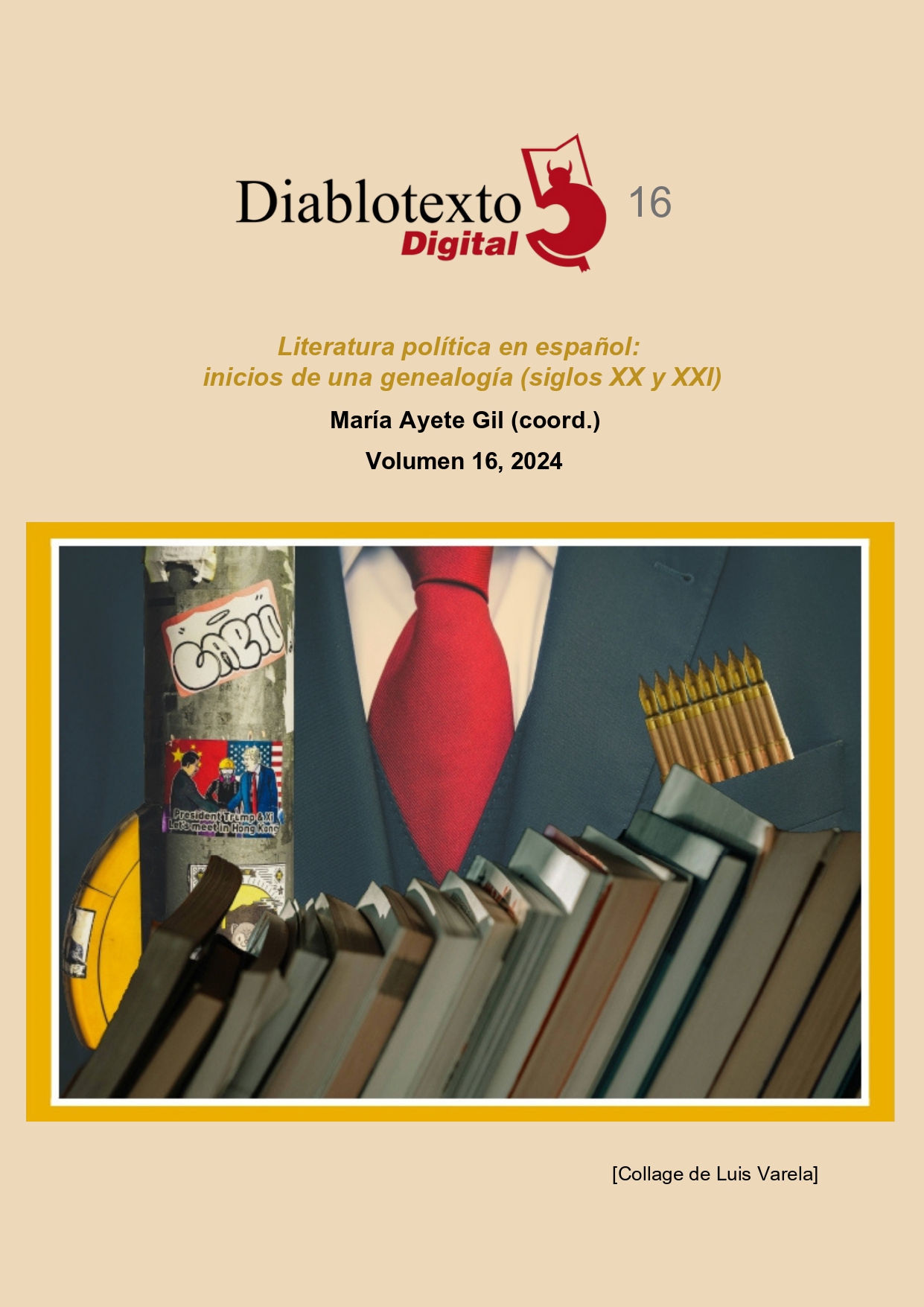Thirsting for Change in Neolibeal Chile: Limpia (2023) by Alia Trabucco Zerán
DOI:
https://doi.org/10.7203/diablotexto.16.29029Keywords:
novel, Chile, neoliberalism, class consciousness, Alia Trabucco Zerán Abstract
Abstract
The novel Limpia (2022) by the Chilean writer Alia Trabucco Zerán relies on the metaphors of water and stone to express the sentiments of rebellion against the neoliberalization of Chilean society that inspired the country’s protest movements of 2019-2020. The profound loneliness of the fully neoliberalized subject is a result of the collapse of networks of relationships and care that resist monetization. The characters of the novel differ in the degree to which they have been able to harness market forces, yet they suffer from the same incapacity to connect with others.
 Downloads
Downloads
 References
References
BAER, Madeline (2014). “Private Water, Public Good: Water Privatization and State Capacity in Chile.” Studies in Comparative International Development n.o 49.2, pp. 141-167.
BARBEE, Harry, et al. (2018). “Selling Slumber: American Neoliberalism and the Medicalization of Sleeplessness.” Sociology Compass, n.o 12.10, pp. 1-16.
BAUER, Carl J. (2013). “The Experience of Water Markets and the Market Model in Chile.” Water Trading and Global Water Scarcity: International Experiences, ed. de Josefina Maestu. Oxon: Routledge, pp. 130-143.
BAUMAN, Zygmunt (2015) [2000]. Modernidad liquida. México, D.F.: Fondo de cultura económica.
BUDDS, Jessica (2008). “Whose Scarcity? The Hydrosocial Cycle and the Changing Waterscape of La Ligua River Basin, Chile.” Contentious Geographies: Environmental Knowledge, Meaning, Scale, ed. de Goodman, Michael K., Boykoff, Maxwell T., y Evered, Kyle T. Farnham: Ashgate, pp. 59-78.
CELEDÓN, Matías (2022). “Limpia de Alia Trabucco Zerán: Causas e inicios no son lo mismo.” Revista Nomadías, n.o 31, pp. 373-77.
CLARKE, Adele E., et al. (2003). “Biomedicalization: Technoscientific Transformations of Health, Illness, and U.S. Biomedicine.” American Sociological Review, n.o 68.2, pp. 161-94.
GORDON-ZOLOV, Terri; ZOLOV, Eric (2022). The Walls of Santiago: Social Revolution and Political Aesthetics in Contemporary Chile. New York: Berghahn.
FOUCAULT, Michel. (2008). The Birth of Biopolitics: Lectures at the Collège de France, 1978-79, ed. de Michel Senellart, François Ewald y Alessandro Fontana, trad. de G. Burchell. New York: Palgrave Macmillan.
HALL, Stuart; O’SHEA, Alan (2013). “Common-sense Neoliberalism.” Soundings: A Journal of Politics and Culture, n.o 55 de invierno, pp. 8-24.
HAN, Byung-Chul (2022) [2016]. La sociedad del cansancio, trad. de Arantzazu Saratxaga Arregi y Alberto Ciria. Barcelona: Herder Editorial.
KRCE-IVANČIĆ, Matko (2018). “Governing Through Anxiety.” Journal for Cultural Research, n.o 22.3, pp. 262-77.
LAVAL, Christian; DARDOT, Pierre (2013). La nueva razón del mundo. Ensayo sobre la sociedad neoliberal, trad. de Alfonso Díez. Barcelona, Gedisa.
MARX, Karl. (1970) [1932]. Manuscritos de economía y filosofía, trad. de Francisco Rubio Llorente. Madrid: Alianza Editorial.
MIROWSKI, Philip (2009). “Postface: Defining Neoliberalism.” The Road from Mont Pèlerin: The Making of the Neoliberal Thought Collective, ed. de Philip Mirowski y Dieter Plehwe. Cambridge: Harvard UP, pp. 417-55.
MOHANTY, Chandra Tolpade (2003). Feminism Without Borders: Decolonizing Theory, Practicing Solidarity. Durham & London: Duke UP.
PECK, Jamie; TICKELL, Adam (2022). “Neoliberalizing Space.” Antipode, n.o 34.3 de julio, pp. 380-404.
PRON, Patricio (2023). “Novela. Un cansancio también precoz. Limpia. Alia Trabucco Zerán.” Letras libres, n.o 259, pp. 48-9.
RENDUELES, César (2013). Sociofobia. El cambio político en la era de la utopía digital. Madrid: Capitán Swing Libros.
ROJAS VILCHES, Natalie Sofía (2021). “No es sequía es saqueo: Movimientos sociales por la recuperación del agua en Chile. De la protesta social a la Constituyente, autoetnografía del caso de Modatima.” Clivatge: Estudis i tesitimonis del conflicte i el canvi social, n.o 9, pp. 1-42.
ROTTENBERG, Catherine (2017). “Neoliberal Feminism and the Future of Human Capital.” Signs: Journal of Women in Culture and Society, n.o 42.2, pp. 329-48.
RUIZ, Carlos; BOCCARDO, Giorgio (2014). Los chilenos bajo el neoliberalismo. Clases y conflicto social. Santiago: El Buen Aire.
SALINAS FIGUEREDO, Darío (2007). “Democratic Governability in Latin America: Limits and Possibilities in the Context of Neoliberal Domination.” Imperialism, Neoliberalism and Social Struggles in Latin America, ed. de Richard A. Dello Buono y José Bell Lara. Leiden/Boston: Brill, pp. 85-102.
TRABUCCO ZERÁN, Alia (2023). Limpia. Barcelona: Penguin Random House.
VENTURA, Patricia (2012). Neoliberal Culture: Living with American Neoliberalism. Farnham / Burlington: Ashgate.
Downloads
Published
How to Cite
-
Abstract23
-
PDF (Español)5
Issue
Section
License
Licencia de reconocimiento de Creative Commons “Reconocimiento - No Comercia l- Sin Obra Derivada
Authors who publish with this journal agree to the following items:
The authors will keep their copyright and guarantee the journal the right of first publication of their work, which will be simultaneously subject to the Creative Commons license that allows third parties to share the work indicating its author and its first publication in the journal. The authors may adopt other non-exclusive license agreements to distribute the version of the published work (e.g., depositing it in an institutional telematic file or publishing it in a monographic volume), with an acknowledgment of its initial publication in this journal. The authors are allowed and encouraged to disseminate their work through the Internet (e.g., in institutional telematic archives or on their website) before and during the submission process, which can produce interesting exchanges and increase citations of the published work. (See Effect of Open Access)




